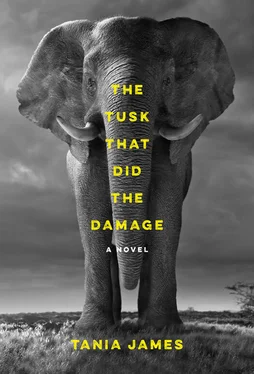They fed the Elephant pomegranate and silky custard and honeyed milk, anything he requested. The Elephant had a grand time, and drowsy with sugar and pleasure, he accepted the Rajah’s offer to stay overnight in the temple, which was the only structure with ceilings high enough to contain him.
The next morning, when the Rajah came by, the Elephant began to say his farewells. But the Rajah begged him to stay one more night, as a neighboring prince had heard of the tusks and was just now on his way to the temple. The Elephant consented, for who could say no to the Rajah? Day after day, the Rajah came with another request, and as visitor after visitor passed through the temple, the Elephant began to worry. One night, he tested the temple gates and found them locked. The next morning, he woke to find his ankle chained.
And so, over the years, hundreds of people came to lay fruit at the feet of the Rajah’s elephant. They honored him in song and sculpture and painting. Children demanded toy elephants with finger-length tusks, and like the children, every rajah wanted a tusker of his own. They sent hunters into the forests, who dug deep pits, then covered them with branches and baited fruit.
In time, no respectable royal menagerie was without a half-dozen tuskers. The temples followed suit. But none was as beloved as the very first tusker, whom the Rajah cast in a silver coin, so that he might be honored to the end of days.
§
The forest elephants decided that the Sage would have to pay. Chief among them was the All-Mother, who searched the darkest leafy depths until she found the cave in which he had been hiding, too narrow for anything wider than a panther to enter.
One evening, as he tiptoed out, she swatted him to the ground and pinned him beneath the plinth of her foot. The Sage wriggled and screamed. Keep it up, she said, and I’ll stamp another hole in your head.
The Sage took shallow breaths.
He was my son, the All-Mother said. He died in that palace, inside their cage. They burned his body in their heathen way. Even his bones! How am I to grieve for my dear one without his bones?
How, the Sage said, unable to continue until the All-Mother removed her foot from his chest. How did you know of the burning?
I smelled his ashes on the wind.
The Sage plopped onto a stone, head in his hands. He hadn’t meant for the pits and the arrows and the chains. It was much worse than when he’d grounded the elephants, who did not speak to him for a full ten years afterward. Now the Sage was a fugitive in his own forest.
The All-Mother demanded that the Sage rid the tuskers of their tusks, but in these matters, the Sage was powerless. Just as the All-Mother raised her trunk to strike him dead, the Sage cried out, Wait! I have one thing to offer!
Folded between two hills was a lake, unknown to man or animal. The Sage would show her the way, and she would show the way to her kin. In this manner, the elephants would know where to go when death was upon them. Here would be their last resting place, at the edge of the secret lake, where they could sip the blue water and die in peace. Here they could come to grieve undisturbed, and their bones and the bones of their descendants would be safe from human hands.
Said the All-Mother, I don’t give a hog’s bottom about your death resort! Man will find it, and all he will see is a field of white gold for the taking. He will carve beads and bend bangles from our remains.
The Sage closed his eyes and saw that this was a narrow possibility. Someone would come, but thinking it best not to go into details, he said instead, This is one place most men will not find, but if any man should come and thieve even the smallest shard, he will lay it back down, along with his life.
And so it was that the elephant graveyard came to be. In time, all the elephants knew the way to the dead. Some elephants were known to limp for miles, haunches bristling with arrows, trickling blood across farm and forest and scrub grass to reach the secret lake. Just as the Sage had promised, one sip and an elephant could expire in peace.
The location of the graveyard was a secret they guarded so carefully no elephant would speak the directions aloud; it was whispered through the pads of their feet. The elephants became so accustomed to keeping silence that they evolved toward a new language, at a frequency and range no human could hear.
Only one elephant broke the oath, a cow born with a single, dirty yellow tusk of which she was very proud. She had been scrapping with a langur, who refused to believe such a graveyard even existed. She told the langur of the location, but before the langur could swing away and tell its cohorts, the All-Mother sprang from the bush and struck the monkey dead. The loose-lipped elephant begged forgiveness from the herd, but there was no greater sin than spoiling the secret. To seal her silence, they ran her off a cliff.
§
One age passed into the next. Landmasses parted and clashed; mountains rose at the seams. Kings fought and married and begat more kings, their exploits embellished and put to song. But the fatherless boy who concerns us now was no royal, so insignificant he did not even warrant a name.
The boy was in need of work. He had heard of a road being dug and paved many miles from his village, so he set out by foot and any lorry that would have him. Along the way, he met an old woman, slouching down the road in rags. He asked her for directions to the roadwork, and when she raised her face and smiled with a single dirty yellow fang, he wished he had waited for another person to ask. She opened her hand and drew him directions along the tangled seams of her palm lines, to a place she claimed would bring him greater riches than any old road. With no one else to guide him, he took her advice, walking and walking, unable to mark time. The sun seemed fixed in place, a white button sewn on blue sky.
At last, the boy arrived at a lake that none of his people had seen, that he had only known from the stories.
What would he tell them of the elephant graveyard? The silence was of another world. There was a lake so still it seemed of glass, and all around its banks, as far as he could see, giant elephant skulls, eye sockets wide as his head, jaws upon jaws of blunt teeth, long, clean bones, rib cages like caves, and tusks of such phosphorescence they seemed to glow from within.
The boy lifted a piece of ivory no longer than his forearm, a kilo at best. How much money could it bring? Surely more than enough to see his family through the year, at which point he would be old enough to ask the foreman for his father’s job.
He ignored the squeeze of terror in his chest. He wrapped the piece in his shirt, tucked it under his arm, and hitched his way back home. The journey lasted several days; he slept at any teahouse that would offer him shelter and sometimes under the stars.
At home, his stepmother unraveled the fabric from the tusk as carefully as if she were removing a bandage from a wound. Her lips parted; she sent out a soft sigh. She clasped the boy’s hand, and it seemed to him, against all his prior assumptions, that she did love him after all, that she would never leave as she had so often threatened to do if he did not bring home a proper wage. Now she took to calling him clever boy and my son, as opposed to the usual son-of-another-mother and orphan boy.
The next morning, the boy moved through the world with fresh hope, glancing on occasion at the base of their cashew tree, where he had buried the pale marvel by twilight. He considered it their buried potential, a seed that would split and spread with plenty. His stepmother planned to ask her brother about where to sell the ivory, but she warned the boy to keep his sweet mouth shut, so as not to attract unfriendly elements.
Читать дальше












